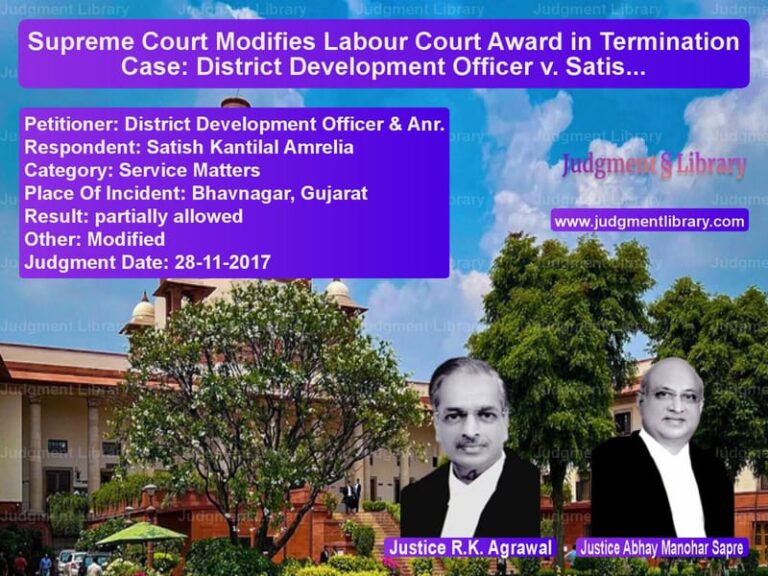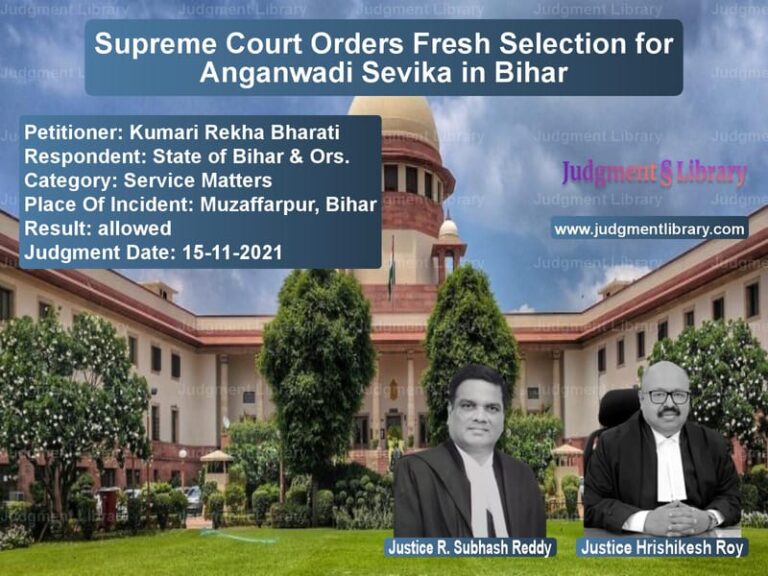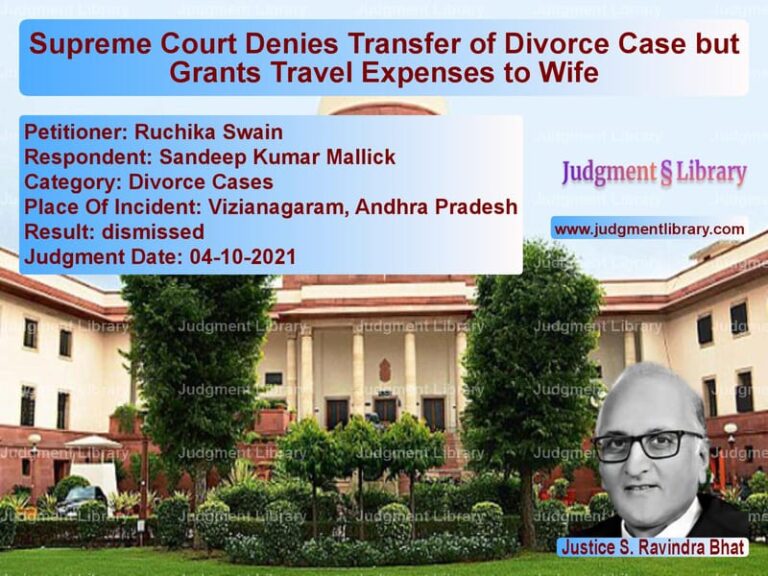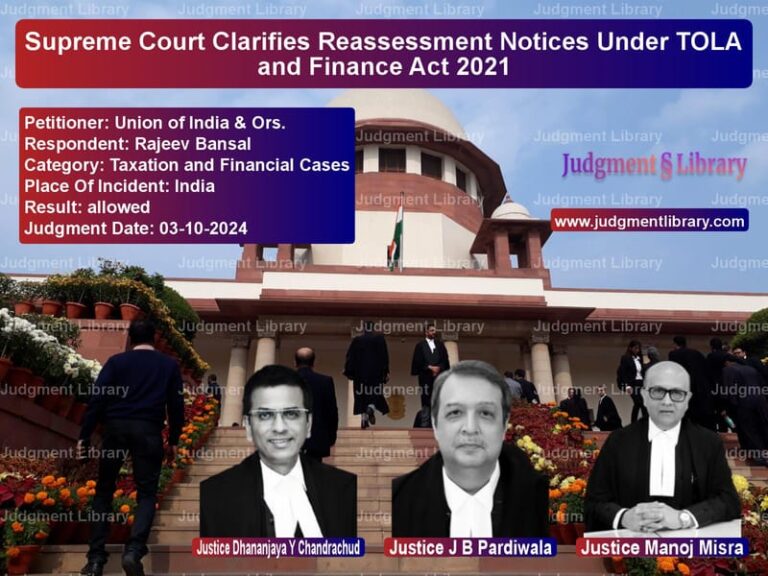Punjab & Sind Bank vs. Frontline Corporation: Supreme Court Upholds Bank’s Right to Sell Mortgaged Property
In a significant ruling, the Supreme Court of India has upheld the right of Punjab & Sind Bank to proceed with the sale of a mortgaged property despite challenges from Frontline Corporation Ltd. The dispute revolved around a settlement agreement and the applicability of the SARFAESI Act, leading to a complex legal battle over creditor rights and property claims.
Background of the Case
The case pertains to a property at 8, Old Court House Street, Kolkata (later renamed 28, Hemant Basu Sarani), which was leased by Punjab & Sind Bank from Bharat Chamber of Commerce in 1972. Subsequently, in 2005, the property was purchased by Frontline Corporation Ltd., which later used it as collateral to secure loans from the bank amounting to Rs. 42.74 crore.
Due to defaults in loan repayments, Punjab & Sind Bank classified the loan as a Non-Performing Asset (NPA) on March 31, 2012, and initiated recovery proceedings under the Securitisation and Reconstruction of Financial Assets and Enforcement of Security Interest (SARFAESI) Act, 2002. The bank issued a possession notice in 2012 and took steps to recover its dues through the sale of the property.
Legal Proceedings
In response, Frontline Corporation challenged the bank’s actions on multiple fronts:
- It filed a securitization application before the Debt Recovery Tribunal (DRT), challenging the bank’s enforcement actions.
- Simultaneously, it filed a civil suit before the Calcutta High Court, seeking specific performance of a settlement agreement it had purportedly reached with the bank.
- It also sought an interim injunction to restrain Punjab & Sind Bank from selling or encumbering the property.
On July 15, 2013, a Single Judge of the Calcutta High Court granted an interim order preventing the bank from finalizing the sale of the property. However, on November 2, 2016, the Single Judge vacated this order, ruling that the bank, as a secured creditor, had the right to enforce its security under the SARFAESI Act and could not be restrained from doing so.
Division Bench Reinstates Injunction
Frontline Corporation appealed against the Single Judge’s order, and on January 30, 2017, the Division Bench of the High Court set aside the order. The Division Bench held that:
- The bank was estopped from repudiating its obligations under the settlement agreement.
- The SARFAESI Act did not absolutely bar the civil court’s jurisdiction.
- The bank was restrained from selling the property until the rights of the parties were fully determined.
Supreme Court’s Observations
The Supreme Court, while examining the case, made the following key observations:
- “The jurisdiction of the civil court is barred in respect of matters which a Debt Recovery Tribunal (DRT) or an Appellate Tribunal is empowered to determine under the SARFAESI Act.”
- “The bar under Section 34 of the SARFAESI Act applies even to matters which may be taken cognizance of by the DRT, even if no measures have been initiated under Section 13(4) of the Act.”
- “The only exceptions to this bar are cases where the secured creditor’s actions are fraudulent or so absurd that they do not require a detailed inquiry.”
- “The claim of Frontline Corporation does not fall within the limited exceptions allowing civil court intervention.”
Final Judgment
The Supreme Court ruled in favor of Punjab & Sind Bank and set aside the Division Bench’s order. The Court upheld the Single Judge’s decision, affirming the bank’s right to proceed with the sale of the property. It also reinforced the legal principle that secured creditors have priority rights under the SARFAESI Act and cannot be restrained from enforcing their security.
Implications of the Judgment
This ruling has significant implications for banking and finance law in India:
- Strengthening of Creditor Rights: The judgment reinforces the authority of banks and financial institutions to recover debts through the SARFAESI Act without unnecessary judicial interference.
- Limited Civil Court Jurisdiction: The decision reiterates that civil courts have limited power to intervene in disputes where specialized tribunals like the DRT have jurisdiction.
- Clarity on Promissory Estoppel: The ruling clarifies that mere reliance on an alleged settlement agreement cannot override the statutory rights of secured creditors.
Conclusion
The Supreme Court’s verdict in Punjab & Sind Bank vs. Frontline Corporation Ltd. is a landmark ruling that upholds the rights of secured creditors while limiting the scope for borrowers to delay recovery proceedings through civil suits. By reinforcing the primacy of the SARFAESI Act, the judgment provides much-needed clarity and stability to India’s financial and legal framework for debt recovery.
Petitioner Name: Punjab & Sind Bank.Respondent Name: Frontline Corporation Ltd..Judgment By: Justice B.R. Gavai, Justice Aravind Kumar.Place Of Incident: Kolkata, West Bengal.Judgment Date: 18-04-2023.
Don’t miss out on the full details! Download the complete judgment in PDF format below and gain valuable insights instantly!
Download Judgment: punjab-&-sind-bank-vs-frontline-corporatio-supreme-court-of-india-judgment-dated-18-04-2023.pdf
Directly Download Judgment: Directly download this Judgment
See all petitions in Bankruptcy and Insolvency
See all petitions in Corporate Compliance
See all petitions in Company Law
See all petitions in Judgment by B R Gavai
See all petitions in Judgment by Aravind Kumar
See all petitions in allowed
See all petitions in Quashed
See all petitions in supreme court of India judgments April 2023
See all petitions in 2023 judgments
See all posts in Corporate and Commercial Cases Category
See all allowed petitions in Corporate and Commercial Cases Category
See all Dismissed petitions in Corporate and Commercial Cases Category
See all partially allowed petitions in Corporate and Commercial Cases Category







